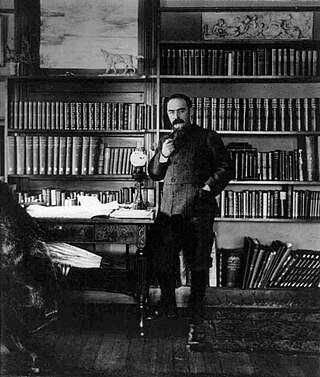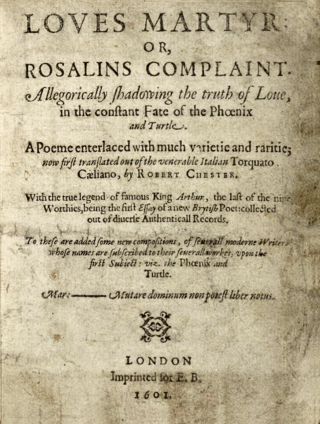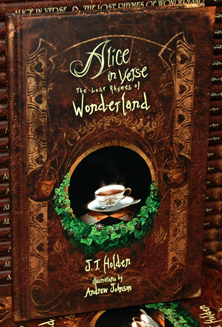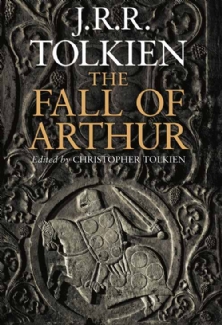
Poetry is a form of literary art that uses aesthetic and often rhythmic qualities of language to evoke meanings in addition to, or in place of, literal or surface-level meanings. Any particular instance of poetry is called a poem and is written by a poet. Poets use a variety of techniques called poetic devices, such as assonance, alliteration, euphony and cacophony, onomatopoeia, rhythm, and sound symbolism, to produce musical or incantatory effects. Most poems are formatted in verse: a series or stack of lines on a page, which follow a rhythmic or other deliberate pattern. For this reason, verse has also become a synonym for poetry.

Thomas Stearns Eliot was a poet, essayist and playwright. He is considered to be one of the 20th century's greatest poets, as well as a central figure in English-language Modernist poetry. His use of language, writing style, and verse structure reinvigorated English poetry. He is also noted for his critical essays, which often reevaluated long-held cultural beliefs.

George Chapman was an English dramatist, translator and poet. He was a classical scholar whose work shows the influence of Stoicism. William Minto speculated that Chapman is the unnamed Rival Poet of Shakespeare's sonnets. Chapman is seen as an anticipator of the metaphysical poets of the 17th century. He is best remembered for his translations of Homer's Iliad and Odyssey, and the Homeric Batrachomyomachia.

Frank Gelett Burgess was an American artist, art critic, poet, author and humorist. An important figure in the San Francisco Bay Area literary renaissance of the 1890s, particularly through his iconoclastic little magazine, The Lark, and association with The Crowd literary group. He is best known as a writer of nonsense verse, such as "The Purple Cow," and for introducing French modern art to the United States in an essay titled "The Wild Men of Paris." He was the illustrator of the Goops murals, in Coppa's restaurant, in the Montgomery Block and author of the popular Goops books. Burgess coined the term "blurb."

The Road Goes Ever On is a song cycle first published in 1967 as a book of sheet music and as an audio recording. The music was written by Donald Swann, and the words are taken from poems in J. R. R. Tolkien's Middle-earth writings, especially The Lord of the Rings. The title of the song cycle is taken from "The Road Goes Ever On", the first song in the collection. The songs are designed to fit together when played in sequence. The ninth song "Lúthien Tinúviel" was added in an appendix rather than in the main sequence. Swann performed the cycle for Tolkien, who approved of the music except for the Quenya song "Namárië"; he suggested it should be in the style of a Gregorian chant, which he hummed; Swann used that melody for the song.
"Home on the Range" is a classic cowboy song, sometimes called the "unofficial anthem" of the American West. Dr. Brewster M. Higley of Smith County, Kansas, wrote the lyrics as the poem "My Western Home" in 1872 or 1873, with at least one source indicating it was written as early as 1871.
Cowboy poetry is a form of poetry that grew from a tradition of cowboys telling stories.

Arthur Chapman was an early twentieth-century American poet, newspaper columnist and author. He wrote a subgenre of American poetry known as cowboy poetry. His most famous poem was Out Where the West Begins.

"The Absent-Minded Beggar" is an 1899 poem by Rudyard Kipling, set to music by Sir Arthur Sullivan and often accompanied by an illustration of a wounded but defiant British soldier, "A Gentleman in Kharki", by Richard Caton Woodville. The song was written as part of an appeal by the Daily Mail to raise money for soldiers fighting in the Second Boer War and their families. The fund was the first such charitable effort for a war.

"The Lost Chord" is a song composed by Arthur Sullivan in 1877 at the bedside of his brother Fred during Fred's last illness. The manuscript is dated 13 January 1877; Fred Sullivan died five days later. The lyric was written as a poem by Adelaide Anne Procter called "A Lost Chord", published in 1860 in The English Woman's Journal.

"Mandalay" is a poem by Rudyard Kipling, written and published in 1890, and first collected in Barrack-Room Ballads, and Other Verses in 1892. The poem is set in colonial Burma, then part of British India. The protagonist is a Cockney working-class soldier, back in grey, restrictive London, recalling the time he felt free and had a Burmese girlfriend, now unattainably far away.
The Shadow of Night is a long poem written by George Chapman; it was first published in 1594, in an edition printed by Richard Field for William Ponsonby, the prestigious publisher of Edmund Spenser and Sir Philip Sidney.

Robert Chester is the mysterious author of the poem Love's Martyr which was published in 1601 as the main poem in a collection which also included much shorter poems by William Shakespeare, Ben Jonson, George Chapman and John Marston, along with the anonymous "Vatum Chorus" and "Ignoto".
"Submarines" is a poem written by Rudyard Kipling (1865-1936), and set to music by the English composer Edward Elgar in 1917, as the third of a set of four war-related songs on nautical subjects for which he chose the title "The Fringes of the Fleet".
A line is a unit of writing into which a poem or play is divided: literally, a single row of text. The use of a line operates on principles which are distinct from and not necessarily coincident with grammatical structures, such as the sentence or single clauses in sentences. Although the word for a single poetic line is verse, that term now tends to be used to signify poetic form more generally. A line break is the termination of the line of a poem and the beginning of a new line.

Alice in Verse: The Lost Rhymes of Wonderland (2010) is a reimagining of Lewis Carroll's 1865 novel Alice's Adventures in Wonderland written by British-American author J.T. Holden. It tells the story of Alice's Adventures in Wonderland in 19 rhyming poems, each written in the same style as Lewis Carroll's original verse. The book includes 36 illustrations by American artist Andrew Johnson.

The Fall of Arthur is an unfinished poem by J. R. R. Tolkien that is concerned with the legend of King Arthur. A posthumous first edition of the poem was published by HarperCollins in May 2013.

The Traveller; or, a Prospect of Society (1764) is a philosophical poem by novelist Oliver Goldsmith. In heroic verse of an Augustan style it discusses the causes of happiness and unhappiness in nations. It was the work which first made Goldsmith's name, and is still considered a classic of mid-18th-century poetry.
Caroline Dana Howe was an American writer of prose, poetry, and hymns. Her celebrated song, "Leaf by Leaf the Roses Fall", was claimed and used by several different authors, until her authorship was reasserted, the publishers appending her name to all later editions. A large number of Howe's songs were set to music for which they were easily adapted, and were found in sheet music and in church collections. The songs were gathered into at least 26 collections, and it was said that no living writer in Maine was more favorably known in that day as a writer of songs than Howe. She was also well known as a writer of short serial stories, juvenile sketches, and essays. The Massachusetts Sunday School Society published a book of about 200 pages of hers, carried successfully through several editions. Howe died in 1907.
Arthur Kay, né Kautzenbach was a German-American conductor, composer, arranger, and cellist. Educated in Silesia and Berlin, he emigrated to the United States in 1907, where, after a few seasons as cellist of the Boston Symphony Orchestra and conductor of the Boston Pops Orchestra, he embarked on a career as conductor, composer, and arranger in operetta, silent film, and talkies, first primarily on the East Coast and from 1918 on the West Coast.














